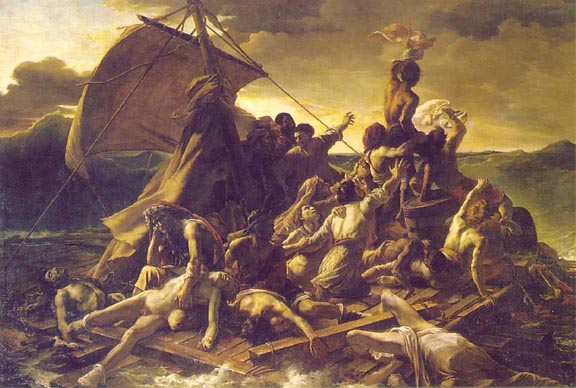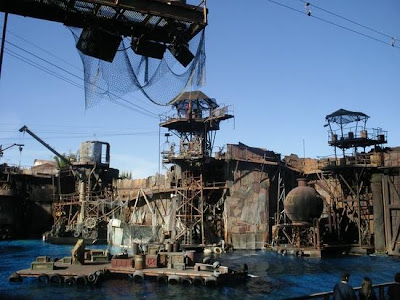
Posted on 02/16/2011 4:47:56 AM PST by Kaslin
Here's a novel idea: Escape the suffocating chains of intrusive government by starting your own country!
That's Patri Friedman's idea. He comes from an impressive line of libertarian thinkers. Milton Friedman, the Nobel-prize-winning free-market economist, was his grandfather. His father is David Friedman, author of the libertarian classic "The Machinery of Freedom." Milton Friedman advocated severely limited government. David Friedman thinks we need no government at all. And now Patri believes he has an effective solution to bad government: communities on the ocean surface, or seasteading.
As a fan of the free market, Friedman understands the benefits of competition. The competitive process teaches us ways to do things we otherwise never would learn. This is important because resources are scarce and we want the most from them. In the crucible of entrepreneurial rivalry, where consumers are free to say yea or nay, competitors are pushed to do better, and under this pressure they come up with things no monopolistic bureaucrat would ever think of. That's why F.A. Hayek called competition a "discovery procedure."
Governments provide various services, but they do so monopolistically. This makes them inept, even when performing valuable functions. You can move to a different city or state to escape government burdens, but it doesn't seem possible to start a whole new country. Governments claim every square mile of the earth.
What is someone looking for better governance to do? In 2008, Friedman set up The Seasteading Institute. His website states: "(W)e believe that experiments are the source of all progress: To find something better, you have to try something new. But right now, there is no open space for experimenting with new societies. That's why we work to enable seasteading communities -- floating cities -- which will allow the next generation of pioneers to peacefully test new ideas for government. The most successful can then inspire change in governments around the world."
In Friedman's view, there is no time to lose. Skyrocketing spending and crushing debt push governments toward crisis. Political incentives being what they are, there is little will for the needed overhaul. The retirement benefits promised by governments are totally unsustainable, and yet proposing significant cuts in benefits has been political suicide. While there is at least serious talk about cuts now, powerful constituencies will mobilize to try to portray any cutter as a monster.
Friedman is convinced that only competition can produce the way to extricate us from the mess the politicians have created. "Seasteaders believe that government shouldn't be like the cell phone carrier industry, with few choices and high customer lock-in. Instead, we envision a vibrant startup sector for government, with many small groups experimenting with innovative ideas as they compete to serve their citizens. ... The world needs a place where those who wish to experiment with building new societies can go to test out their ideas. All land is already claimed -- which makes the oceans humanity's next frontier."
To promote actual experiments in seasteading, Friedman's institute seeks to launch a "Seasteading Evangelist" program, with local chapters for enthusiasts. By 2015, the institute hopes to present its Poseidon Award, "our prize for the establishment of the first independent seasteading community." To win, a community will need at least 50 full-time residents, financial self-sufficiency, seastead real estate for sale on the open market and de-facto political autonomy.
Friedman doesn't expect lots of people to drop everything and start living on the ocean immediately. He writes in the upcoming issue of The Freeman (thefreemanonline.org): "Technology, though, has the potential to make the ocean a feasible alternative for more people. Early pioneers will learn lessons that will make life on the ocean easier, thus prompting previously unwilling pioneers to make the move. Over time, the costs in comfort, safety and access to civilization will fall and the ocean will be just another place to live. This is the path we see on any frontier."
I will not be among the first to move to a seastead. But I wish Patri well. We need all the alternatives to big arthritic government that we can get.
Seasteading alert!
Don’t have the time to go into it here, but it’s a very bad idea.
Back in the 90s this sort of project was the rage among Libertarians. The idea was to buy a bunch of deep sea oil platforms and link them together into a colony of sorts. Rules would have been pretty much pure Libertarian (so not a heck of a lot of them).
It didn’t, of course, ever get off the shore. I don’t really see it as likely this time either.
400 years ago these countries were called “ships” and seasteaders were called “privateers”. Each ship was run by the rules it’s captain set.
” Nobel-prize-winning “
in todays world, I would have that removed from my resume
Sounds like Admiral John Galt
Ocean waters off the Somali coast would offer a mild climate.
However, Stossel fails here. Besides my first cynical reaction of: just wait, some government or the U.N. will interfere. I find myself asking, "What is the economic case for these places?"
Unless driven by government fiat (or oppression), all major human settlement is driven by economic considerations. Heck, even the Pilgrims had to get sponsorship from capitalists in England to form their colony. So unless you can make a "business case" for sea colonies, you won't get them done by the private sector.
A rare FAIL for Mr. Stossel here.
i am constantly astonished at the creative ability of human beings. what a novel idea. it will help build a template for the eventual colonization of the galaxy. i hope this catches on. just imagine the possibilities. A brand new Botany Bay for one.the permutations are endless.


Reminds me of The Millennial Project: Colonizing the Galaxy in Eight Easy Steps, which offers a pathway to sustained space flight - #2 Aquarius - Colonize offshore for food, energy and practice before trying to colonize another planet.
What could possibly go wrong w/ a libertarian utopia?
There was a company based in Tampa FL that was planning a floating city about 10 years ago. Had its own airport and floated around the world going with favorable weather and the ability to explore the entire world.
Sounds expensive, besides, stuff that is on the surface of the ocean can sink.
Sounds wonderful in concept, but in practice I could envision some serious problems that would need to be dealt with. Continuous sources of food and fresh water being among them. Too bad you can’t drink the water from the ocean, and that cattle don’t have gills. I suppose one could grow an adequate garden for a handful of people, but vegetable bearing plants tend to not like ocean water either. Such issues immediately make you dependent on someone who is on the mainland to produce something for you, just for survival. You’re also going to need something to trade for those consumables. I don’t see much in the way of revenue generation living out on the ocean, so you are gonna need a padded bank account on day one just to sustain the people living out there and the operation.
Uh...
I thought we've DONE this already?
Duh... Who's going to do all the WORK?
Disclaimer: Opinions posted on Free Republic are those of the individual posters and do not necessarily represent the opinion of Free Republic or its management. All materials posted herein are protected by copyright law and the exemption for fair use of copyrighted works.